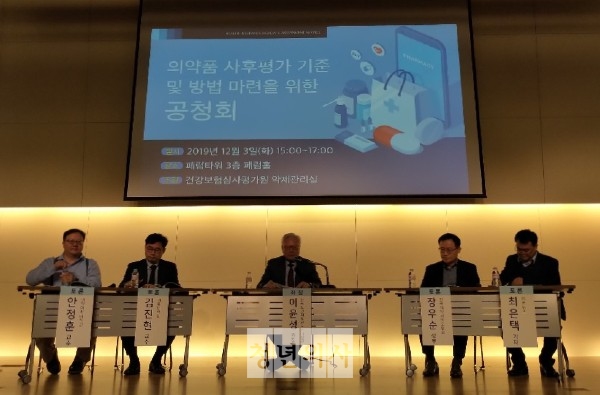The pharmaceutical industry adamantly criticized the government’s plan to evaluate expensive anticancer therapies and orphan drugs, aimed at increasing the overall health insurance coverage and reducing the health insurance cost.
Drug companies claimed that getting regulatory reviews for drugs, which had already gone through clinical usefulness evaluation, could undermine the pharmaceutical industry’s overall growth.
The Ministry of Health and Welfare introduced the “positive list system” from 2007 to 2011 to classify registered drugs into 49 groups by efficacy, and assessed the drugs’ clinical usefulness and economic value. Then, the government made a list of the drugs sequentially.
However, pharmaceutical industry officials expressed dissatisfaction with the government’s move, at a hearing for setting up the criteria for post-approval evaluation, organized by the Health Insurance Review and Assessment Service (HIRA), in Seoul, Tuesday.

Park Eun-yeong, head of the team for improving the pharmaceutical benefit assessment system at HIRA, said the drug cost accounts for 25 percent of the entire health insurance cost and the proportion was gradually rising. With the population aging, the drug cost is expected to climb further, she said.
“We plan to do the post-approval evaluation to secure financing for broader health insurance coverage by enhancing the ‘adequacy’ of drug costs,” Park explained.
Among reimbursable medicines, HIRA will review high-cost drugs such as anti-cancer drugs and treatments for rare and intractable diseases and those whose clinical usefulness is uncertain.
The evaluation will be based on relevant textbooks and guidelines, “health technology assessment” (HTA) reports, clinical papers, and substitution possibilities and drug specificity.
Park further explained that the government will assess drugs that need to be checked for clinical usefulness, drugs that need to be managed due to demographic changes and increased usage, or drugs that need to be evaluated by the post-approval evaluation subcommittee in consideration of impacts on society and public health.
When HIRA prepares for the evaluation criteria, it will draw up guidelines considering whether drugs have evidence-based documents, expertise, and validity, Park added.
Physicians were positive about the post-approval evaluation system, saying it could discriminate gems from pebbles. However, the evaluation criteria were too complicated, they said.
Kim Jin-hyun, a professor at Seoul National University College of Nursing, said the government’s overall policy direction and content were reasonable, supported by valid grounds.
“There has been a controversy over anti-cancer drugs and many treatments. In terms of patient safety and fair payment, we need to review the evaluation system and operate it in a systematic manner,” he said.
Kim went on to say that too many evaluation criteria may be justified at first glance but they may produce unfair results, and look inconsistent and unfair.
“Evaluation criteria should be as simple and universal as possible,” he added.
Ahn Jeong-hoon, a professor at the Health Convergence Department of Ewha Womans University, agreed with Kim, saying too detailed criteria would cause a problem.
“It is fair to evaluate drugs based on randomized controlled trials (RCT). But in the case of rare and intractable diseases, there could be no RCT. Then how can you set the criteria?,” Ahn said.
“Rather than setting particular criteria, the government needs to be flexible to make predictable cases in advance so that it can do the clinical assessment, or allow other drugs to be used,” he added.
‘Post-approval evaluation is just repetition and we get nothing’
Pharmaceutical companies were unhappy about the plan for post-approval evaluation. As they had already undergone clinical usefulness evaluation during the 2007-2011 listing project, the upcoming post-approval evaluation will be a “double assessment,” they said.
Chang Woo-soon, executive director of external affairs at the Korea Pharmaceutical and Bio-Pharma Manufacturers Association (KPBMA), said HIRA seemed as if it would carry out finance-based post-approval evaluation and performance-based evaluation every year, regularly.
“This is a policy that the pharmaceutical industry could fear. I’m worried that it could become more difficult to run a pharmaceutical business in Korea,” he said.
The post-approval evaluation system seems to aim at injecting drug costs for chronic diseases into those for severe diseases through the so-called “pharmaceutical trade-off,” he went on to say.
“It is questionable whether the government’s move was based on a social consensus and whether it was in line with insurance principles,” Chang added.
A pharmaceutical industry official, who attended the hearing, said he could understand why HIRA would push for the re-evaluation.
However, when pharmaceutical companies could not understand the results of the 2011 re-evaluation, they might feel that the upcoming review would be a repetition of the evaluation, he noted.

